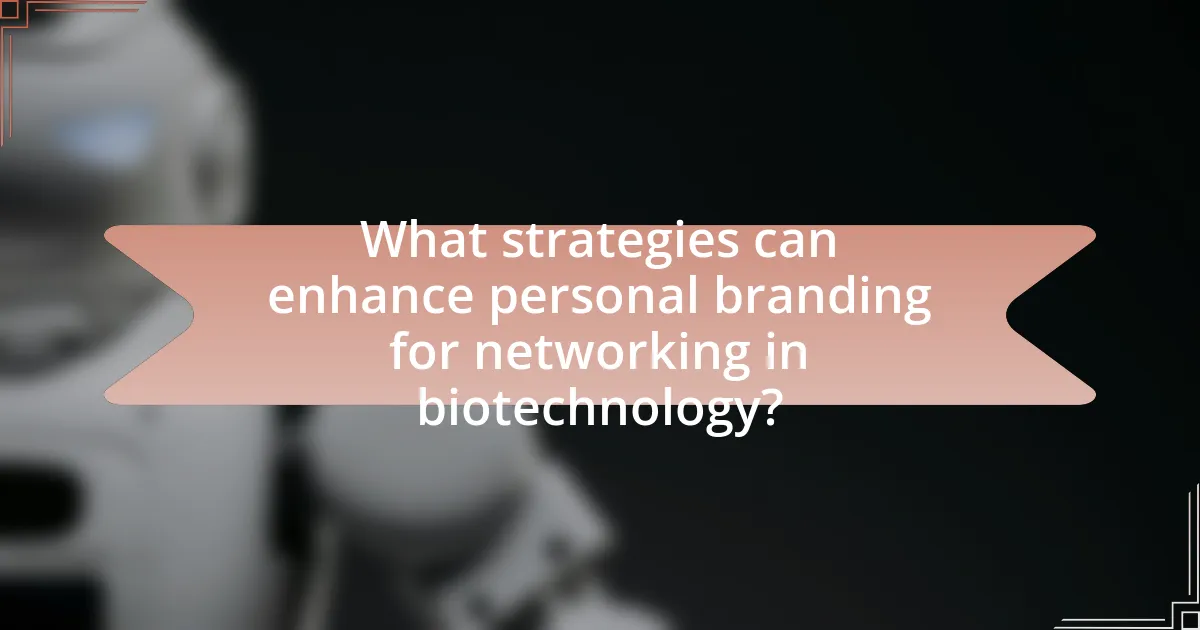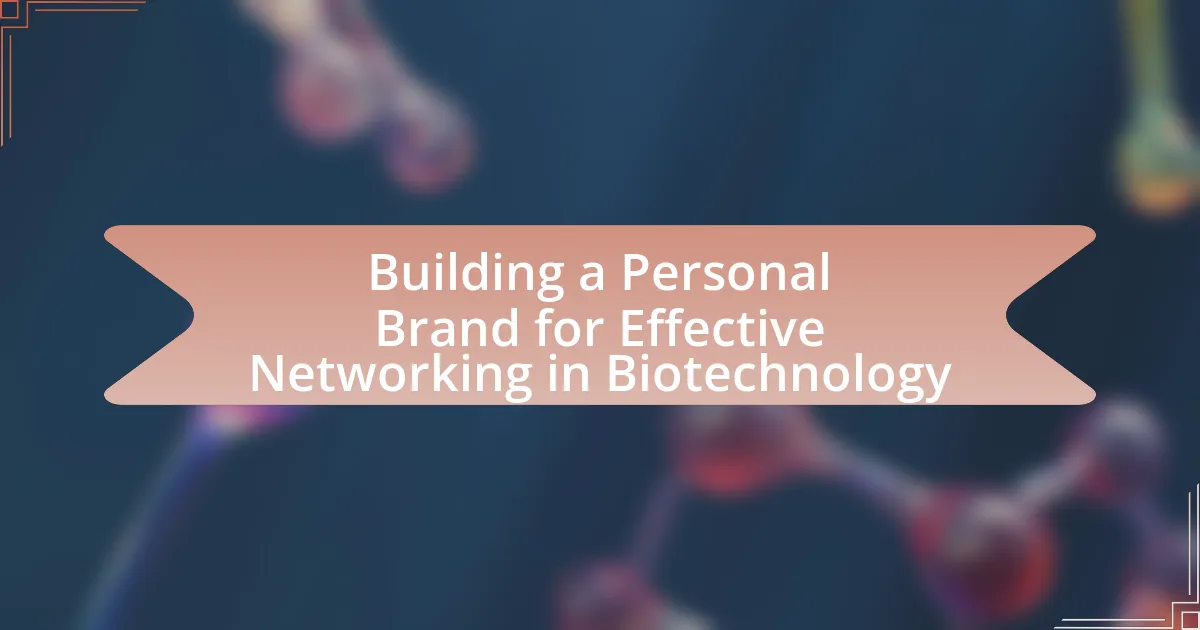Building a personal brand for effective networking in biotechnology is essential for establishing a professional identity that showcases expertise and fosters connections within the industry. This article outlines the importance of personal branding in biotechnology, highlighting key elements such as expertise, visibility, authenticity, and networking. It discusses strategies for defining and articulating a unique value proposition, leveraging social media, and engaging in networking opportunities to enhance professional visibility. Additionally, the article addresses common challenges faced in personal branding and offers best practices for maintaining a strong brand presence in the rapidly evolving biotechnology sector.

What is Building a Personal Brand for Effective Networking in Biotechnology?
Building a personal brand for effective networking in biotechnology involves creating a distinct professional identity that highlights expertise, values, and unique contributions to the field. This process is essential as it enables individuals to establish credibility and foster meaningful connections with peers, industry leaders, and potential collaborators. Research indicates that professionals with a strong personal brand are more likely to be recognized for their skills and attract opportunities, as evidenced by a LinkedIn survey showing that 70% of employers value personal branding in hiring decisions.
Why is personal branding important in the biotechnology field?
Personal branding is crucial in the biotechnology field because it establishes an individual’s professional identity and credibility, which are essential for networking and career advancement. In a highly specialized industry like biotechnology, where expertise and innovation are paramount, a strong personal brand helps professionals differentiate themselves from peers, attract opportunities, and build trust with stakeholders. Research indicates that professionals with a well-defined personal brand are more likely to be recognized as thought leaders, leading to increased collaboration and partnership opportunities, which are vital for success in the rapidly evolving biotechnology landscape.
What are the key elements of a personal brand in biotechnology?
The key elements of a personal brand in biotechnology include expertise, visibility, authenticity, and networking. Expertise establishes credibility through specialized knowledge in biotechnology, which can be demonstrated by academic qualifications, research contributions, or industry experience. Visibility is achieved through active participation in relevant conferences, publications, and online platforms, enhancing recognition within the field. Authenticity involves being genuine and transparent in communications, fostering trust among peers and stakeholders. Networking is crucial for building relationships and collaborations, which can be facilitated through professional organizations and social media engagement. These elements collectively contribute to a strong personal brand that can effectively influence and connect within the biotechnology sector.
How does personal branding influence networking opportunities?
Personal branding significantly enhances networking opportunities by establishing a recognizable identity that attracts like-minded professionals. A strong personal brand communicates expertise and values, making individuals more appealing to potential connections. For instance, a study by the Harvard Business Review found that professionals with a well-defined personal brand are 70% more likely to be approached for networking opportunities. This increased visibility and perceived credibility facilitate access to valuable contacts and collaborations within the biotechnology sector.
How can one define their personal brand in biotechnology?
One can define their personal brand in biotechnology by identifying their unique skills, experiences, and values that differentiate them in the field. This involves conducting a self-assessment to understand one’s strengths, such as expertise in genetic engineering or experience in clinical trials, and aligning these with personal values like innovation or sustainability. Additionally, creating a consistent online presence through platforms like LinkedIn, showcasing relevant projects, publications, and networking with industry professionals reinforces this brand. Research indicates that professionals with a well-defined personal brand are more likely to attract opportunities and collaborations, as they clearly communicate their expertise and vision to potential employers and peers.
What steps are involved in identifying personal strengths and values?
Identifying personal strengths and values involves a systematic approach that includes self-reflection, feedback collection, and assessment tools. First, individuals should engage in self-reflection by journaling or meditating on their experiences, achievements, and what they find fulfilling. This introspection helps clarify personal values and strengths. Next, seeking feedback from peers, mentors, or supervisors provides external perspectives on one’s abilities and character traits, which can reveal strengths that may not be self-evident. Additionally, utilizing assessment tools such as personality tests or strengths inventories, like the CliftonStrengths assessment, can offer structured insights into personal attributes. Research indicates that individuals who understand their strengths and values are more likely to achieve career satisfaction and success, as highlighted in studies by the Gallup Organization.
How can one articulate their unique value proposition?
To articulate a unique value proposition, one must clearly define what sets them apart in their field, particularly in biotechnology. This involves identifying specific skills, experiences, and insights that provide distinct advantages to potential collaborators or employers. For instance, a professional might highlight their expertise in a niche area of biotechnology, such as CRISPR technology, combined with a proven track record of successful project management in clinical trials. This clarity not only communicates their unique strengths but also aligns with the needs of their target audience, making it easier for them to understand the value offered. Research indicates that professionals who effectively communicate their unique value proposition are 70% more likely to secure networking opportunities and job offers, as they resonate more with the specific demands of the industry.

What strategies can enhance personal branding for networking in biotechnology?
To enhance personal branding for networking in biotechnology, individuals should focus on establishing a strong online presence through platforms like LinkedIn, where they can showcase their expertise and connect with industry professionals. Engaging in relevant discussions, sharing insights, and publishing articles on biotechnology topics can further position them as thought leaders. Networking at industry conferences and participating in workshops allows for face-to-face interactions, which can solidify relationships and enhance visibility. Additionally, seeking mentorship from established professionals in the field can provide guidance and open doors to new opportunities. These strategies are supported by research indicating that personal branding significantly impacts career advancement and networking success in specialized fields like biotechnology.
How can social media be leveraged for personal branding?
Social media can be leveraged for personal branding by creating a consistent online presence that showcases expertise and engages with relevant communities. By sharing industry insights, participating in discussions, and networking with professionals in biotechnology, individuals can establish credibility and visibility. Research indicates that 70% of employers use social media to screen candidates, highlighting the importance of a well-curated online image. Additionally, platforms like LinkedIn allow users to connect with industry leaders and share accomplishments, further enhancing personal branding efforts.
What platforms are most effective for biotechnology professionals?
LinkedIn and ResearchGate are the most effective platforms for biotechnology professionals. LinkedIn facilitates networking, job searching, and professional branding, with over 900 million users, making it a prime space for industry connections. ResearchGate, with its focus on academic and scientific collaboration, allows biotechnology professionals to share research, engage with peers, and access a vast repository of scientific publications. Both platforms enhance visibility and foster professional relationships essential for career advancement in biotechnology.
How can one create engaging content that reflects their brand?
To create engaging content that reflects a brand, one must align the content with the brand’s core values, mission, and target audience. This alignment ensures that the content resonates with the intended audience, fostering connection and engagement. For instance, a biotechnology brand focused on innovation should produce content that highlights cutting-edge research, industry advancements, and thought leadership, thereby establishing authority and relevance in the field. Research indicates that brands that consistently communicate their values and engage with their audience see a 23% increase in customer loyalty (Gallup, 2020). By utilizing storytelling techniques, visuals, and interactive elements, brands can further enhance engagement, making their content not only informative but also compelling and memorable.
What role does networking play in building a personal brand?
Networking is essential in building a personal brand as it facilitates connections that enhance visibility and credibility. By engaging with industry professionals, individuals can share their expertise, gain insights, and establish a reputation within their field. Research indicates that 85% of jobs are filled through networking, highlighting its importance in career advancement and brand recognition. Additionally, networking allows for the exchange of ideas and collaboration opportunities, further solidifying one’s personal brand in the biotechnology sector.
How can one effectively connect with industry professionals?
To effectively connect with industry professionals, one should leverage networking platforms such as LinkedIn to engage with relevant content and participate in discussions. Engaging with industry-specific groups and attending conferences or webinars enhances visibility and fosters relationships. Research indicates that 85% of jobs are filled through networking, highlighting the importance of building connections in professional settings. By actively participating in these environments, individuals can establish credibility and create opportunities for collaboration within the biotechnology sector.
What networking events should biotechnology professionals attend?
Biotechnology professionals should attend industry-specific conferences, such as the Biotechnology Innovation Organization (BIO) International Convention, which is the largest global event for biotechnology, attracting thousands of professionals and showcasing innovations. Additionally, events like the American Society for Microbiology (ASM) Microbe conference and the European Society of Human Genetics (ESHG) annual meeting provide valuable networking opportunities with peers and leaders in the field. These events facilitate connections that can lead to collaborations, job opportunities, and advancements in research, as they gather experts, investors, and stakeholders from various sectors of biotechnology.

What are the common challenges in building a personal brand in biotechnology?
Common challenges in building a personal brand in biotechnology include navigating complex regulatory environments, differentiating oneself in a competitive field, and establishing credibility among peers and stakeholders. The biotechnology sector is heavily regulated, which can limit the ways individuals promote their expertise and achievements. Additionally, the rapid pace of innovation means that professionals must continuously update their knowledge and skills to remain relevant, making it difficult to maintain a consistent brand identity. Establishing credibility is further complicated by the need for scientific validation and peer recognition, which can take time and effort to achieve.
What obstacles do professionals face when establishing their brand?
Professionals face several obstacles when establishing their brand, including lack of clarity in their unique value proposition, limited visibility in a competitive market, and challenges in effectively communicating their expertise. A clear value proposition is essential; without it, professionals struggle to differentiate themselves, which is critical in the biotechnology sector where competition is intense. Limited visibility can stem from inadequate networking opportunities or ineffective use of social media platforms, which are vital for brand recognition. Furthermore, the ability to communicate expertise is often hindered by a lack of confidence or public speaking skills, making it difficult to engage with potential collaborators or employers. These challenges are supported by research indicating that personal branding significantly impacts career advancement, particularly in specialized fields like biotechnology.
How can one overcome the fear of self-promotion?
To overcome the fear of self-promotion, one can start by reframing self-promotion as sharing valuable information rather than boasting. This shift in perspective helps individuals view self-promotion as a way to contribute to their field, particularly in biotechnology, where sharing knowledge can foster collaboration and innovation. Research indicates that professionals who actively engage in self-promotion are more likely to be recognized for their expertise and can enhance their career opportunities. For instance, a study published in the Journal of Business and Psychology found that individuals who effectively promote their achievements are perceived as more competent and are often rewarded with greater professional advancement. By focusing on the value of their contributions and practicing self-promotion in low-stakes environments, individuals can gradually build confidence and reduce anxiety associated with self-promotion.
What strategies can help in dealing with negative feedback?
To effectively deal with negative feedback, individuals should adopt strategies such as active listening, reframing the feedback, and seeking clarification. Active listening involves fully concentrating on the feedback without interrupting, which helps in understanding the perspective of the giver. Reframing the feedback allows individuals to view it as an opportunity for growth rather than a personal attack, fostering a constructive mindset. Seeking clarification ensures that any misunderstandings are addressed, allowing for a more accurate interpretation of the feedback. These strategies are supported by research indicating that individuals who engage in active listening and reframing are more likely to experience improved emotional resilience and personal development in professional settings.
How can one measure the effectiveness of their personal brand?
One can measure the effectiveness of their personal brand through metrics such as online engagement, professional opportunities, and feedback from peers. Online engagement can be quantified by analyzing social media interactions, website traffic, and content shares, which indicate how well the brand resonates with the target audience. Professional opportunities, such as job offers, collaborations, or speaking engagements, serve as tangible evidence of brand impact in the biotechnology field. Additionally, soliciting feedback from peers and mentors can provide qualitative insights into how the brand is perceived, helping to identify strengths and areas for improvement. These methods collectively offer a comprehensive view of personal brand effectiveness.
What metrics can indicate successful networking outcomes?
Successful networking outcomes can be indicated by metrics such as the number of meaningful connections made, the frequency of follow-up interactions, and the conversion rate of connections into collaborative opportunities. These metrics provide quantifiable insights into the effectiveness of networking efforts. For instance, a study by LinkedIn found that professionals who actively engage in networking activities are 70% more likely to receive job offers, highlighting the importance of building and maintaining connections. Additionally, tracking the number of referrals generated from networking can further demonstrate the impact of these relationships on professional growth and opportunities in the biotechnology sector.
How can feedback from peers enhance personal branding efforts?
Feedback from peers can significantly enhance personal branding efforts by providing insights into strengths and areas for improvement. This peer evaluation helps individuals refine their messaging and presentation, ensuring alignment with their target audience’s expectations. For instance, constructive criticism can highlight unique skills or experiences that may not have been effectively communicated, allowing for a more authentic and compelling personal brand. Research indicates that peer feedback fosters a growth mindset, which is crucial for continuous improvement in personal branding. By actively seeking and incorporating peer feedback, individuals can create a more resonant and impactful personal brand that stands out in the competitive biotechnology networking landscape.
What are the best practices for maintaining a personal brand in biotechnology?
To maintain a personal brand in biotechnology, professionals should consistently showcase their expertise through thought leadership, networking, and online presence. Establishing a strong online presence involves regularly sharing insights on platforms like LinkedIn and participating in relevant discussions, which can enhance visibility and credibility. Networking at industry conferences and engaging with peers can foster valuable connections and collaborations. Additionally, staying updated with the latest advancements in biotechnology and continuously learning through courses or certifications reinforces authority in the field. Research indicates that professionals who actively engage in these practices are more likely to be recognized as leaders in their domain, thereby strengthening their personal brand.
How often should one update their personal brand strategy?
One should update their personal brand strategy at least once a year. This frequency allows individuals to reflect on their evolving goals, industry trends, and personal growth. Regular updates ensure that the brand remains relevant and aligned with current professional aspirations and market demands, particularly in the dynamic field of biotechnology, where advancements occur rapidly. Research indicates that professionals who actively manage their personal brand are more likely to achieve career success and networking opportunities, underscoring the importance of timely updates.
What ongoing activities can support a strong personal brand?
Ongoing activities that can support a strong personal brand include consistently creating and sharing valuable content, engaging with industry peers, and participating in relevant events. Regularly publishing articles or posts on platforms like LinkedIn establishes expertise and keeps the audience informed. Engaging with peers through comments, shares, and discussions fosters relationships and enhances visibility. Additionally, attending conferences, webinars, and networking events in the biotechnology field allows for direct interaction with industry leaders and potential collaborators, reinforcing one’s presence and credibility in the sector. These activities collectively contribute to a robust personal brand by showcasing knowledge, building connections, and maintaining an active presence in the industry.


